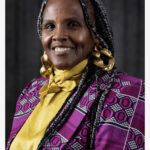At a time when the country is ripe for intellectual terrorism, the Trump administration’s attacks on education and the executive order mandating the renaming of the Gulf of Mexico to the Gulf of America rewrite historical and geographical narratives and chip away at our capacity to think for ourselves.
The U.S. ranks 24th out of 35 countries in reading, yet more than 4,000 books nationwide have been banned or censored. Conventional wisdom says that the person who teaches you to read, teaches you to think. Which is why organized campaigns to ban and censor books, vilify Diversity, Equity and Inclusion initiatives as unconstitutional, and delegitimize diverse perspectives and experiences as un-American are nothing short of fascist attempts to stymie and control the most powerful attribute of our democracy—free will.
Free will is about having the ability and capacity to choose without manipulation or coercion. The ability to think through manipulation and coercion relies on using higher-level conceptual skills. Access to countering knowledge makes it possible to relate to and name the full expression of human experience, strengthening our abilities and enlarging our capacity to self-govern in a way that fortifies our democracy.
Higher-level thinking skills are critical when wading through the brazen falsehoods, vilifications of dissenting voices and resurgence of jingoistic history revisionism, where patriotism is weaponized to distort the past and suppress critical perspectives. The glorification of ignorance by the ultra-right and the Trump administration is the recalibration and deepening of the legacy of miseducation.
“You can’t fix a problem you can’t name.” A renowned critical scholar, Dr. Kimberly Crenshaw, warns that something more tyrannical is afoot. The systematic gutting of centuries-old social justice thought infrastructure suppresses critical thought and dismantles educational oversight to keep us ignorant.
Naming, or calling a thing a thing, is facilitated through an arsenal of conceptual skills, making it possible to analyze power, interrogate language and deconstruct dominating narratives. Anti-Black percepts and assumptions used to discredit the analytic value of woke-ism worked to vilify critical race theory (CRT) and paved the way for the abolishment of DEI programs and initiatives.
This knowledge system holds us accountable for who we say we are, making it part of the check-and-balance consciousness of American democracy, even as we watch congressional checks and balances fall apart before our eyes.
High-level thinking skills are used every day; however, in schools, skills are isolated from the lived experience embedded and delivered through content. As a result, higher-level thinking skills are more often than not associated with education and schooling.
Skill development versus content development is an ongoing debate in education, notwithstanding the present totalitarian maneuvering, which seeks to control the minds and comprehensive power of the American populace.
The nation’s overreliance on high-stakes testing intuitively stymies critical thinking, creating an environment ripe for intellectual terrorism. Further ripening the environment are neurocognition hypotheses that social media alters cognitive functioning, to what extent is still being explored. All this is in the wake of an alarming growing illiteracy in America.
Adding insult to injury, adult illiteracy in the U.S. has increased since 2017. Fifty-four percent of adults between 16 and 74 read at a 6th-grade level, making handling basic living and workplace tasks possible.
While 39 bills to ban or censor books have become law in under a decade. Organized book censorship and banning campaigns increased 92% from 2022 to 2023. Almost 50% of those titles represent the voices and lived experiences of BIPOC, and LGBTQIA+ folk are banned or censored as obscene.
Cherry-picked curricula, like the 1776 patriotic curriculum, reflective teaching and learning aligned with the tone and tenor of the Jim and Janice Crow eras, are offered to replace the void left in the curriculum. Carter G. Woodson described indoctrination by education as miseducation. He wrote, “when you control a (wo)man’s thinking, you do not have to worry about his actions. You do not have to tell him not to stand here or go yonder. He will find his proper place and stay in it.”
Lying and erasing critical perspectives to dumb down Americans are not only part of the Trump legacy. These controlling processes are also pillars in a system of miseducation that has long sought to keep the American populace compliant and unchallenging.
We disrupt the recalibration and deepening of miseducation by reflecting on our personal miseducation experiences. We can use our platforms or create space to speak truth to power, courageously debunking lies with our intellectual resources. We can intentionally use dissenting voices that challenge the status quo to activate higher-level thinking skills. The strength of our democracy depends on our ability to stand ten toes down in the face of intellectual terrorism – unwavering in our commitment to truth, historical accuracy and critical inquiry.
